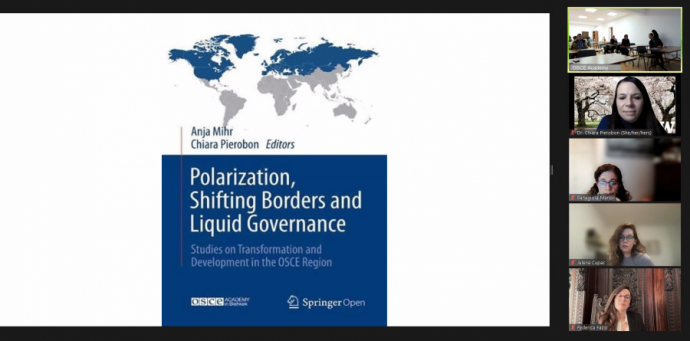News
Book Launch “Polarization, Shifting Borders and Liquid Governance: Studies on Transformation and Development in the OSCE Region”
On 20 December 2023, the OSCE Academy hosted a book lunch event on recently published book “Polarization, Shifting Borders and Liquid Governance: Studies on Transformation and Development in the OSCE Region,” Springer 2023. The hybrid event was opened by Dr. Indira Satarkulova, Acting Director of the OSCE Academy, and moderated by the book Editors Prof. Dr. Anja Mihr, MAHRS Academic Supervisor at OSCE Academy, and Prof. Dr. Chiara Pierobon, DAAD Visiting Professor, Center for West European Studies/EU Center, University of Washington, Seattle, USA.
The event featured the presentation of six authors of the book: Federica Fazio, Dublin City University School of Law & Government, Ireland, on her chapter: Italian Governments and Political Parties Vis-a-Vis the War in Ukraine; Prof. Chiara Pierobon, on her chapter: Shaping German Feminist Foreign Policy in Times of Conflict in Ukraine; Prof. Panagiota Manoli, University of the Peloponnese, Department of Political Science and International Relations, Greece, on her chapter: Greece’s Response to Russia’s War on Ukraine; Dr. Eleonora Tafuro, Institute for International Political Studies (ISPI), Russia, Caucasus and Central Asia Centre, Italy, on her chapter: Tarafsız: Turkey’s Impartial Stance Vis-a-Vis Russia’s War Against Ukraine; Dr. Jelena Cupać, WZB-Berlin Social Science Cente Global Governance, Germany, on her chapter: OSCE’s Resilience in Times of War; and Dr. Anja Mihr, on her chapter: Transitional Justice in Ukraine.
This open-access book explores the security dynamics amid the polarization, shifting borders, and liquid governance that define the Zeitenwende era in Europe's eastern neighbourhood and Central Asia. Presenting various case studies, the volume unveils the intricate web of border dynamics and practices, including the nuanced interplay of border disputes within the Organization for Security and Cooperation in Europe (OSCE) member states. The contributions shed new light on how contested borders and liquid modes of governance have impacted the engagement of international organizations such as the European Union (EU), North Atlantic Treaty Organization (NATO), and OSCE in security crises and conflict prevention. Delving deeper, a special part dissects the ongoing Russia-Ukraine conflict and examines European and international responses. By analyzing the stances of diverse European countries, their neighborhood, and international organizations, this section uncovers commonalities and disparities in their approaches to the Ukrainian crisis. The book will be available in the beginning of 2024.



 Русская версия
Русская версия